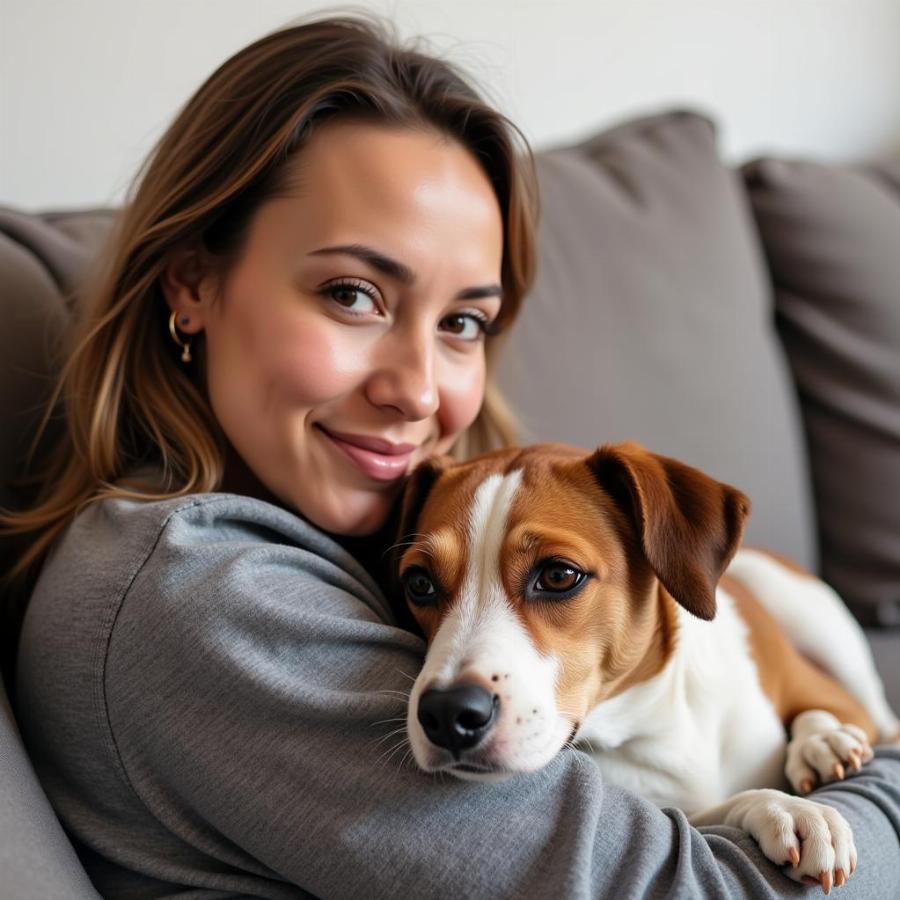Have you ever looked at your dog after giving them praise and wondered what’s going on in that furry little head? It’s no secret that dogs light up when we call them “good boy” or “good girl,” but the science behind their reactions is truly fascinating. From wagging tails to sparkling eyes, their transformation goes beyond simple obedience – it’s a window into the complex emotional lives of our canine companions.
The Power of Positive Reinforcement: More Than Just Treats
When you shower your dog with praise like “good boy,” you’re engaging in positive reinforcement. This simple act triggers the release of dopamine in their brains, the same feel-good chemical associated with rewards in humans. This surge of dopamine creates a pleasurable experience for your dog, encouraging them to repeat the behavior that earned them the praise.
But it goes beyond just the chemical reaction. Dogs are highly social animals who crave connection and approval from their pack, which is you! Your words of affirmation signify acceptance, love, and strengthen the bond you share.
Reading the Signs: How to Tell Your Dog is Happy
You don’t need to be a dog whisperer to decipher your dog’s body language when they’re feeling the “good boy” glow. Here are some tell-tale signs:
- Tail wags: A loose, full-body wag that often extends to a happy wiggle is a clear indicator of joy.
- Ears perked up: While ear position varies by breed, perked-up ears generally signal alertness and interest, often associated with positive emotions.
- Relaxed posture: A happy dog will often have a relaxed stance with an open mouth and soft eyes.
- Licking lips: This can be a sign of anticipation for more praise or treats, indicating they’re enjoying the interaction.
- Playful bows: If your dog responds to “good boy” with a playful bow, inviting you to join in the fun, you’ve definitely made their day.
Beyond “Good Boy”: Exploring Different Forms of Positive Reinforcement
While “good boy” is a classic, don’t be afraid to mix up your vocabulary of praise! Dogs are incredibly adaptable and learn to associate different words and phrases with positive reinforcement.
- Use their name: Saying their name in an excited, high-pitched tone can be just as rewarding.
- Be specific: Instead of a general “good boy,” try praising specific actions: “Good sit!” “Yes, fetch!”
- Vary your tone: A calm, soothing “good boy” after a stressful situation can be incredibly comforting for your dog.
The Importance of Consistency and Timing
Dr. Emily Parker, a certified veterinary behaviorist, emphasizes the importance of consistency in positive reinforcement training. “Dogs thrive on routine and predictability,” she says. “Using consistent praise and rewards helps them understand what behaviors are desirable and strengthens the bond between you.”
Timing is equally crucial. For your dog to make the connection between their action and your praise, deliver it immediately after the desired behavior. This immediate feedback reinforces the positive association.
Building a Stronger Bond: The True Reward
 Dog cuddling with its owner on a couch
Dog cuddling with its owner on a couch
Ultimately, the transformation you witness in your dog after a heartfelt “good boy” goes beyond training. It’s about nurturing the unique and profound bond you share. By understanding the science behind their reactions and using positive reinforcement effectively, you’re not only shaping their behavior, you’re cultivating a relationship built on trust, love, and companionship.
FAQs:
Q: Can I spoil my dog with too much praise?
A: It’s highly unlikely! Unlike material rewards, verbal praise won’t lead to weight gain or other health issues.
Q: What if my dog doesn’t respond to “good boy”?
A: Every dog is different. Experiment with different words, tones, and even physical touch to find what resonates with your furry friend.
Q: Is it ever too late to start using positive reinforcement?
A: Absolutely not! Dogs of all ages benefit from positive reinforcement training.
Looking for more expert advice on all things dog? Visit Beaut Dogs at https://beautdogs.com for a wealth of information on dog breeds, care, training, and much more. When you need a helping paw, reach out to us at [email protected] for personalized guidance.